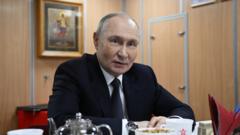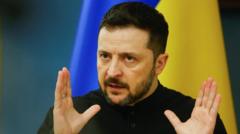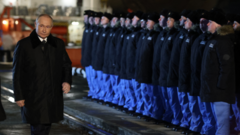After three days of negotiations in Saudi Arabia, Ukraine and Russia have tentatively agreed to halt hostilities in the Black Sea. While this marks a crucial step towards reducing maritime attacks, doubts linger over the enforcement and the conditions surrounding the deal, particularly sanctions on Russian agricultural exports.
Cease-Fire Agreement Reached Between Ukraine and Russia in the Black Sea

Cease-Fire Agreement Reached Between Ukraine and Russia in the Black Sea
In a pivotal development, Ukraine and Russia have reached a cease-fire understanding in the Black Sea, but concerns remain regarding its effectiveness and implications for sanctions.
Article text:
In a breakthrough announcement, Ukraine and Russia have come to an agreement regarding a cease-fire in the Black Sea region, as stated by the White House. This cessation of hostilities, while significant, is characterized as a temporary measure rather than a complete end to the conflict. Moreover, discussions are set to continue regarding the specifics of how to halt attacks on energy infrastructure for both nations.
These negotiations, which unfolded over the course of three days in Saudi Arabia, appear to have yielded concessions primarily favorable to Russia. Notably, the Kremlin indicated that it would respect the cease-fire only if restrictions on Russian agricultural exports from the West were lifted. In response, the U.S. has signaled its willingness to aid in restoring Russia’s access to international markets for agricultural products, including fertilizers.
Ukrainian President Volodymyr Zelensky expressed concern over the implications of these conditions, highlighting that they represent a dilution of Ukraine's negotiating power and a potential weakening of sanctions against Russia. He also noted that any lifting of trade restrictions would require the approval of the European Union, which presently seems improbable.
Both Ukraine and Russia share a vested interest in curtailing attacks on their energy assets, particularly given the pressure the Russian navy has faced from ongoing Ukrainian military operations in the Black Sea. As the situation remains fluid, the timeline and concrete steps toward implementing this partial cease-fire have yet to be clarified, with Ukraine's defense officials advocating for immediate follow-up discussions to solidify the agreement.
In a breakthrough announcement, Ukraine and Russia have come to an agreement regarding a cease-fire in the Black Sea region, as stated by the White House. This cessation of hostilities, while significant, is characterized as a temporary measure rather than a complete end to the conflict. Moreover, discussions are set to continue regarding the specifics of how to halt attacks on energy infrastructure for both nations.
These negotiations, which unfolded over the course of three days in Saudi Arabia, appear to have yielded concessions primarily favorable to Russia. Notably, the Kremlin indicated that it would respect the cease-fire only if restrictions on Russian agricultural exports from the West were lifted. In response, the U.S. has signaled its willingness to aid in restoring Russia’s access to international markets for agricultural products, including fertilizers.
Ukrainian President Volodymyr Zelensky expressed concern over the implications of these conditions, highlighting that they represent a dilution of Ukraine's negotiating power and a potential weakening of sanctions against Russia. He also noted that any lifting of trade restrictions would require the approval of the European Union, which presently seems improbable.
Both Ukraine and Russia share a vested interest in curtailing attacks on their energy assets, particularly given the pressure the Russian navy has faced from ongoing Ukrainian military operations in the Black Sea. As the situation remains fluid, the timeline and concrete steps toward implementing this partial cease-fire have yet to be clarified, with Ukraine's defense officials advocating for immediate follow-up discussions to solidify the agreement.




















